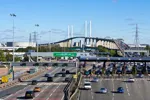According to industry observers, the number of vehicles fitted with ‘black box’ telematics equipment in the UK is approaching 400,000 and the market for tracker devices is likely to grow by 30% this year.
Fleets are the main impetus for this growth as companies look for new ways to reduce the cost of running vehicles.
“Firms employ us for a variety of reasons, mainly concerned with introducing improvements in efficiency that lower operational costs,” says Andrew Yeoman, managing director of Trimble Mobile Resource.
“But tracking is also about giving fleet managers the ability to know the precise location of vehicles in order
to meet the demands of their customers.”
Trimble equipment monitors the huge fleets operated by BT and British Gas and was supplied to help take out cost, he says.
“Customers can use tracking data to create automatic time sheets because it shows the movement of field staff.
“This often results in a reduction in claims for overtime and our latest generation technology shows it is possible to reduce fuel consumption by 15%,” he says.
Those claims are backed by the Institute of Transport Management, whose research shows that vehicle tracking reduces the average fuel bill by 14%.
“Based on a cost of 71p per day, monitoring each vehicle for a month works out at around £25. As the cost per mile for the average light commercial vehicle is £1, you need save only one mile each day to get a 50% return on your investment,” says Yeoman.
According to TomTom Work, telematics can pay for itself within six months purely on the more truer mileage claims made by drivers.
It expects a shake-up of the market this year as fleets look to lower risk by signing shorter contracts.
Unlike some it does not believe pay-as-you-go is the solution, claiming this puts too much financial pressure on the supplier.
But while suppliers are talking about substantial growth in sales this year, monitoring drivers can attract ‘spy in the cab’ accusations. It’s the most common complaint, say fleets, from both staff and trade unions.
Other fleet managers have raised concerns over the legal implications to the business if they are able to track driving attitudes.
“If you know drivers are speeding you have to do something about it – it puts the onus on the company,” says Dennis Dugen, travel and car fleet manager at WSP Management Services.
Tom Robertson, transport manager at Fife Council, adds: “If a driver has a serious accident, the police can obtain the data from the telematics system – are all fleets aware of this?”
Joanne Shepherd, fleet manager at Clarke Group, has been using the Cybit tracking system for a number of years and is now trialling Road Angel.
She says the benefits include monitoring speeding and idle times and enabling regional managers to check time sheets.
“Drivers realise they are being monitored and they are reducing their speed,” she says. “We compile reports that are sent to their managers if they break the speed limit and that covers us for duty of care.”
Idling time is also reducing, she adds. Trimble estimates that vehicles are often idling for 15 minutes, four or five times a day on average.
With fuel costing £5 per gallon, this can be an extra cost of £1,200 a year for just one vehicle.
One of Navman’s customers is saving more than £25,000 a year by reducing idling times on its seven vehicles.
Telematics provides peripheral benefits. It can inform fleets which driver is at the wheel, while links with vehicle diagnostics provide information on mileage and fuel consumption.
Navman Wireless executive vice-president Tony Neill claims that companies with all sizes of fleets will save hundreds of thousands of pounds through enhanced vehicle routing, the elimination of private or unauthorised mileage and the better allocation of vehicles to jobs.
“One customer with a 25-strong fleet is saving £60,000 annually in fuel costs, as well as increasing profits by running a more efficient business.
"By cutting just four miles a day in avoidable mileage in a Ford Transit, businesses can expect to save enough on fuel alone to pay for the technology,” says Neill.
A move aimed at easing cashflow pressures is helping Tracker remain on course for growth, says managing director Bill Raynal.
“The recession is proving to be a double-edged sword for many businesses. While there is undoubtedly a need to save money, it’s also obvious that new rules relating to cashflow present challenges. This will always be a barrier to investment,” he says.
“I think we will continue to see growth in telematics, but providers are also under continued pressure on price and margins, which makes it more challenging to generate the profits we need for investment for the future.”
Case study: Lewis Day Transport
An investment of more than £250,000 a year on tracking is delivering 100% value for one of the UK’s most diverse fleets.
“We rely on it almost totally for essential tracking and I don’t think we could operate without it,” says Lewis Day Transport fleet director Hylton Treisman.
Each one of the London operator’s motorcycles, cars, limousines, vans and ambulances is linked to a web-based tracking system providing 30-second updates on location, speed, mileage covered and route information.
“I couldn’t put a figure on our savings, but they are considerable.
“With 1,200 vehicles on the move, we simply don’t have the ability to oversee each one. But our drivers know that we can watch them and pull them in if we spot an over-speed situation,” says Treisman.
“They also know that the system helps us with the many appeals we have to make over penalty notices claiming our vehicles have spent more than the allocated time for loading or unloading.
“Precise timing data also helps us deal with allegations that our vehicles have been late when collecting passengers. Without it, we would be paying out lots of money.”
Thinking big... and small
A pan-European network and a well-known brand name are promising a bright future for TomTomWork, says UK sales manager Jeremy Gould.
“We were set up only three years ago, but there are already more than 100,000 vehicles equipped with our solution across Europe and having a name that’s synonymous with navigation is proving a big advantage,” he says.
“The demise of some suppliers means our industry doesn’t have a particularly good reputation, so being part of a recognised brand is important. It’s also good because navigation is part of our solution.”
Thinking small is paying dividends for Road Angel Fleet, according to managing director Graham Mackie.
“While most of our competitors go for larger fleets and the corporate sector, we focus on the small to medium market and are seeing consistent growth,” he says.
“It is tough out there and the biggest issue is the absence of business finance. But we have been able to team up with banks that are prepared to fund the telematics area.
"As a result, we have good orders and a lot of prospects in the pipeline.”
Telematics help list
When looking to implement a vehicle tracking system, companies can face resistance from drivers who feel the system will make their jobs more demanding, according to David Isom, of vehicle tracking specialist V-SOL.
To tackle their reservations, V-SOL has put together the following help list for fleets:
- Security GPS tracks the exact whereabouts of a vehicle, so should any problems be incurred it will be quicker for help to arrive.
- Saves on paperwork With a constant record of what time specified locations are reached, there is no longer the need for drivers to worry about filling in timesheets.
- Improved communication Most vehicle tracking systems offer a voice communication function, so drivers can speak directly with fleet managers at very low cost and without worrying about bad mobile reception.
- Enhanced performance Without having to worry about logging journey times and confirming locations with the office, drivers can concentrate on their main duties and become more efficient.
- Challenge parking fines/speeding tickets In order to dispute parking tickets or speeding fines, firm evidence is needed – reliable tracking data proves the exact location and speed of a vehicle at any time.
- Peace of mind Most tracking systems allow sensors to be fitted to vehicle doors, so any incidents of theft of contents will be recorded through the opening of doors – along with the precise time and location.
- Job security Tracking technology has the potential to make any mobile business far more efficient. Embracing the technology to help bring about such an improvement can only reflect positively on the employee.















Login to comment
Comments
No comments have been made yet.